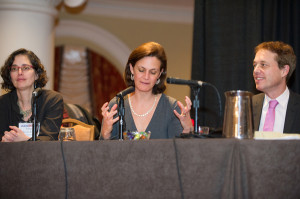Tonight Kenneth Pomeranz will deliver his presidential address, “Histories for a Less National Age.” Last night, following the presentation of awards, Pomeranz’s plenary session discussed civil wars in a more national age, in “‘Other’ Civil Wars of the 1860s: Strive in a Time of Nation-Building.”
By the end of the session it was clear that quotation marks surrounding “other” may also have been applied to the term “civil war.” The reflections by the panelists on the conflicts and their later representations revealed how slippery the term can be. Ussama S. Makdisi spoke on sectarian violence in Ottoman Lebanon and Syria, detailing how an attempt to create a “non-Muslim emancipation” triggered the violence, convincing Western observers that the Middle East was still largely a premodern place. Certainly they would not call it a civil war. Erika Pani discussed the upheaval in Mexico that, despite military-style violence over a long period, has often been referred to as a “reform,” not a civil war. And Tobie Meyer-Fong discussed the period of reconstruction in China after their incredibly bloody Taiping “rebellion,” and how the Qing celebration of loyalty in the face of rebel fanatics helped construct a nation with strong interests in a particular historical interpretation. The very idea of calling these conflicts civil wars opens up new avenues of interpretation.
In his commentary, Sven Beckert reflected on how these conflicts, though not connected in any formal sense, were just “the most violent edge of a larger process” that included a global moment which tied territorialization to political and economic power and the creation of the global south.
Certainly, many similar themes that press against the boundaries of national containers will resurface in Pomeranz’s presidential address, in which he will discuss “the increasing skepticism over our most common frames of reference: the nation, which long dominated the framing of professional history, and area studies units, which were once assumed to represent distinct ‘civilizations.’” Pomeranz will further discuss the implications of this reframing for our teaching.
This post first appeared on AHA Today.
Tags: AHA Today 2014 Annual Meeting
Comment
Please read our commenting and letters policy before submitting.






